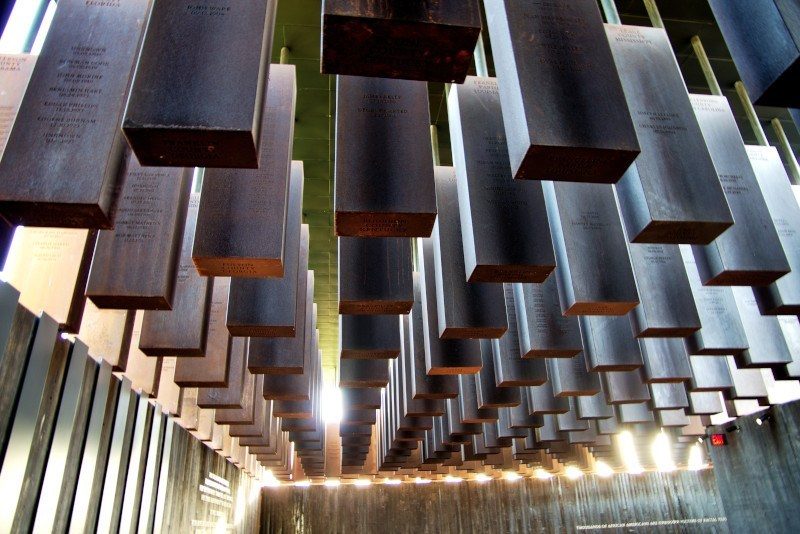
Last month, my wife, her sister and I journeyed to Montgomery, Alabama, to visit the National Peace and Justice Memorial which opened last year. It is a memorial to the thousands of African American victims of racial terror lynchings between 1877 and 1950. It provides an opportunity for this nation to confront its past violence and its legacy.
We walked through an open rectangular building among columns of metal blocks hanging from the ceiling on poles. On each block of metal were engraved the names and dates of individuals who had been lynched in public gatherings, often announced and reported in local newspapers. The names were listed by county. Some counties had multiple blocks.
At first these blocks were at eye level, but as we turned the first corner, the floor moved downward and the hanging blocks moved upward. There were over 4000 names engraved on these blocks as well as a memorial to the unknown victims of this terror.
When we first entered this memorial area, there were signs indicating that this was a sacred place, and we experienced it that way. We could see that people who had come in groups often divided up as we did. It became a solitary experience as each of us meditated on what was before us.
There were also signs that indicated that this place was a healing place. Healing often starts by looking into the darkness. After all, it is the light that enables us to see into the dark places. Our problem is that we often turn away before we can be healed. As Jesus tells us, “All who do evil hate the light and do not come to the light, so that their deeds may not be exposed.” It is when the deeds are exposed that we can begin to change and be healed.
Standing before the columns of engraved names, I felt and reflected on our inhumanity toward other human beings—a condition of inhumanity we all share. It was like looking upon the cross of Christ and realizing that it was our sin that put him there. The cross and the lynching tree call for repentance and conversion into the way of life that God provides.
I also imagine that African Americans experience another movement toward healing through this memorial as they confront a history of abuse, addressing the effects of the sins of others against them, experiencing grief and anger and release into action. There is healing in gaining historical clarity and a vision for the way forward.
The importance of memorials like this for those of us who are white is that they provide another opportunity to confront racism and its legacy. We need these confrontations for our healing. We need light in the darkness to expose our racism so that it does not remain active while hidden from us. After all, like all sin, racism hides. We would like to think it resides in ideologically white supremacist groups or overt racists. But racism is so thoroughly a part of our society, its attitudes and structures, that we are all participants.
To truly confront it, we have to come out of our comfort zones. We have to become self-aware and socially aware and historically aware. We have to be willing to explore ourselves and our society in unfamiliar ways. We have to become aware of our “whiteness”—what whiteness does for us, how it privileges us in a racist society.
It was, after all, people of European descent who came up with the notion of various human “races” as human types (rather than acknowledging gratefully a diversity of peoples and cultures) with white people as the supreme norm. An ideology of whiteness was born that would support the institution of slavery. The legacy of slavery, Jim Crow, lynchings and the present mass incarceration of people of color is the legacy of whiteness as a construct that dehumanizes others. And those of us who are white cannot simply step out of that history and socialized ideology. It is pervasive to the society of which we are a part.
For people of faith, there is the awareness that the Spirit of Truth brings to the light what is hidden in darkness. So, we can pray:
“Gracious God, give us eyes to see and ears to hear. Shine your light into the dark and hidden places of our lives. Give us willing hearts to hear the voices of those harmed by our racism. Help us to keep listening and to not excuse ourselves from the problem. Help us to fast from listening to ourselves and to other white people and instead free us to listen to the voices that our racism has dismissed. Lead us to confess our sin and deliver us from evil. Liberate us from all ways of thinking and acting that separate us from the one human race. Heal us and raise us up to do justice, love mercy and live faithfully. Amen.”
David, this is very, very powerful. Thank you. I’m going to pass it along to others.
Lucille